|
|
|
Sort Order |
|
|
|
Items / Page
|
|
|
|
|
|
|
| Srl | Item |
| 1 |
ID:
090097
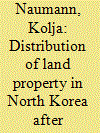

|
|
|
|
|
| Publication |
2009.
|
| Summary/Abstract |
Transforming the North Korean economy into a viable economy based on individual liberty will pose some important problems. From a constitutional point of view, this paper analyzes different possibilities of property distribution in the North after reunification and discusses German experiences as a model for land distribution in North Korea. Possible property rights of citizens in the North and the South are examined. The paper proposes a pragmatic approach, enabling the political decision-makers to formulate solutions that will help the North Korean economy to recover.
|
|
|
|
|
|
|
|
|
|
|
|
|
|
|
|
| 2 |
ID:
090090
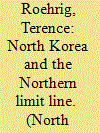

|
|
|
|
|
| Publication |
2009.
|
| Summary/Abstract |
Shortly after the end of the Korean War, the United Nations Command promulgated the Northern Limit Line (NLL) as a maritime boundary in the West Sea (Yellow Sea). Since that time, the NLL has been a source of contention between North and South Korea culminating in two naval clashes in 1999 and 2002. A solution to the NLL dispute in the near future is unlikely so long as the security situation remains the same. North Korea may have a reasonable complaint, and an international tribunal would likely draw the line farther south, though not as far as Pyongyang desires. So long as North Korea remains a serious security threat, South Korea will be reluctant to make any changes. The most likely solution will be a negotiated settlement, but this will require North Korea to demonstrate its willingness to compromise on its position. Pyongyang should continue to state its opposition to the current NLL, but through diplomatic channels that do not threaten security while also taking steps to improve the overall security situation in the region. The views expressed in this report are the author's alone and do not represent the official position of the Department of the Navy, the Department of Defense, or the U.S. government.
|
|
|
|
|
|
|
|
|
|
|
|
|
|
|
|
| 3 |
ID:
090103
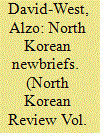

|
|
|
|
|
| Publication |
2009.
|
| Summary/Abstract |
This section contains an overview of major North Korea-related developments between April and November 2008. On May 8, Pyongyang handed over thousands of nuclear-related documents to the United States State Department. On June 26, the U.S. government began the process of delisting North Korea as a state sponsor of terrorism. On June 29, North Korea received a shipment of U.S. food aid. On July 11, a South Korean tourist was shot dead near the Mt. Kumgang resort. On August 11, the deadline passed to remove North Korea from the U.S. terror list. On August 15, Kim Jong-il reportedly suffered a stroke. On August 27, a North Korean spy suspect was arrested in South Korea. On September 19, North Korea announced that it had begun reassembling its nuclear facilities at Yongbyon. On October 11, North Korea was removed from the U.S. terror list. On November 6, a North Korean military delegation made an unprecedented inspection of the Gaesong Industrial Complex. North Korean Review obtained information in this section from online news media.
|
|
|
|
|
|
|
|
|
|
|
|
|
|
|
|
| 4 |
ID:
090101


|
|
|
|
|
| Publication |
2009.
|
| Summary/Abstract |
No one knows for sure how many North Koreans died as a result of the food shortages and related diseases in the 1990s, but estimates of premature deaths range from 220,000 to 3,500,000. The purpose of this paper is to study the political economy of North Korea with two goals in mind: the first is to explicate how and why the regime survived such a devastating famine; the second is to observe the normative implications that can be derived from understanding the regime, from an economic and ethical standpoint. Emphasis is not placed on building a generic model that attempts to identify the main causes of famine, but rather on drawing important insights from one of the greatest humanitarian tragedies of our time.
|
|
|
|
|
|
|
|
|
|
|
|
|
|
|
|
| 5 |
ID:
090094


|
|
|
|
|
| Publication |
2009.
|
| Summary/Abstract |
North Korea is a socialist "dynasty" shrouded in secrecy. The regime's inconsistencies leave even the best of North Korean specialists and commentators befuddled as the country's actions invalidate their predictions. One must, however, understand North Korea's sociopolitical ideology in order to appreciate its inconsistencies as a regime. This paper will discuss the impact of North Korea's ideology in historical and sociopolitical context, as well as show the depth of ideological penetration into every layer of its society. The Juche ideology that has characterized the regime is a peculiar combination of nationalism, Marxism, and Confucianism. Since Kim Il-Sung's death, however, and the succession to power of his son, Kim Jong-Il, North Korea's ideology has metamorphosed into a series of sub-ideologies. The purpose of this paper is to elaborate on the process by which North Korean ideology changed and the paradox between the rise in ideological rhetoric and the weakening legitimacy of the regime under Kim Jong-Il.
|
|
|
|
|
|
|
|
|
|
|
|
|
|
|
|
| 6 |
ID:
090099


|
|
|
|
|
| Publication |
2009.
|
| Summary/Abstract |
This paper discusses the potential for institutional change in North Korea. The paper summarizes and evaluates the discussion on North Korea at the 2008 World Knowledge Forum meeting held in Seoul, South Korea, October 14-16, 2008. The Kaesong Industrial Complex is discussed in the context of a visit on October 14, 2008, by two members of the forum's panel on North Korea. It is easy to be pessimistic about institutional change in North Korea, but it is more productive to be forward looking and focus on potential rather than accomplishment.
|
|
|
|
|
|
|
|
|
|
|
|
|
|
|
|
| 7 |
ID:
090092
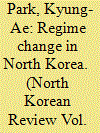

|
|
|
|
|
| Publication |
2009.
|
| Summary/Abstract |
The structuralist perspective of regime change looks at economic constraints as the principal explanatory variable of regime collapse, suggesting that both economic crisis and economic reform give rise to political pluralism, activate civil society, and thus lead to regime change. The Kim Jong Il regime in North Korea escaped its collapse in spite of the prolonged economic crisis. The article offers an analysis of North Korean exceptionalism in regard to the economic crisis and economic development theories of regime change. It argues that several components of political opportunity structures salient to North Korea work as constraints of regime change, and offers an assessment of prospects for activation of North Korea's civil society. An earlier version of this article was published as "Regime Change in North Korea?," in T. Roehrig, J. Seo, and U. Heo, eds., Korean Security in a Changing East Asia (New York, NY: Praeger, 2007), pp 70-92.
|
|
|
|
|
|
|
|
|
|
|
|
|
|
|
|
| 8 |
ID:
090095
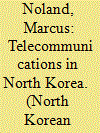

|
|
|
|
|
| Publication |
2009.
|
| Summary/Abstract |
The formation of telecommunications policy poses a difficult challenge for authoritarian regimes: while improvements in telecommunications can contribute to material prosperity, they may also contribute to a loss of control. North Korean policies reveal an ambivalent attitude, driven by conflicting goals of modernization and control. This paper reviews North Korea's telecommunications infrastructure and provides a brief history of North Korean telecommunications policies in a variety of settings, paying particular attention to the recent decision to authorize Orascom, a foreign cellular provider, to provide nationwide cellular service, potentially leapfrogging from North Korea's dilapidated existing systems to a modern system.
|
|
|
|
|
|
|
|
|
|
|
|
|
|
|
|
|
|
|
|
|